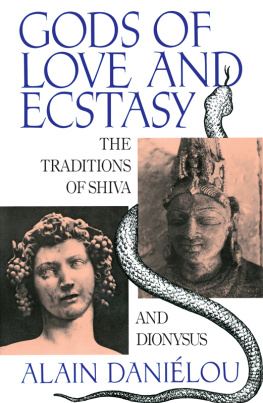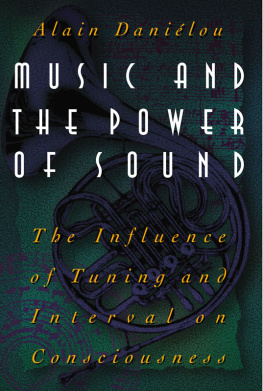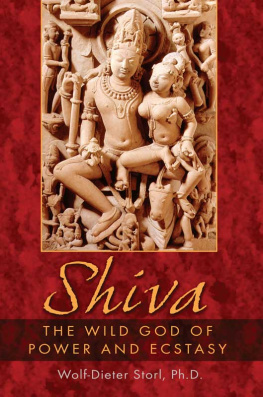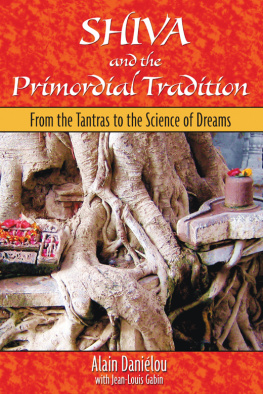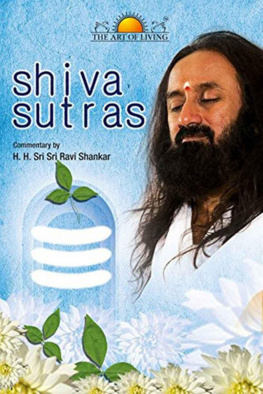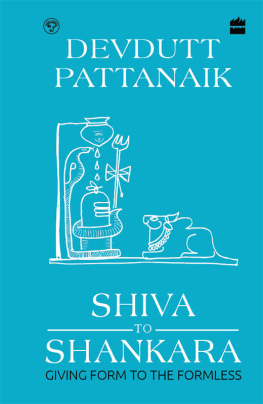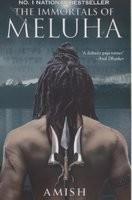GODS OF
LOVE AND
ECSTASY

Shiva in yoga posture, Temple of Vaital Deul, Bhuvaneshwar, Orissa, 9th century. (In the authors collection).
GODS OF LOVE AND ECSTASY
THE TRADITIONS OF SHIVA AND DIONYSUS
ALAIN DANILOU

INNER TRADITIONS
ROCHESTER, VERMONT
CONTENTS
FOREWORD
This book is not an essay on the history of religions. It reflects my personal experience of discovering the most fundamental of religions in that veritable museum of world history which is India. Prior to Vedic Hinduism, Greek religion, Zoroastrianism and even Abraham, this early religion is the outcome of mans efforts since his remotest origins to understand the nature of creation in its balanced beauty and cruelty, as well as the manner in which he can identify himself in the Creators work and cooperate with him. This religion is naturistic, not moralistic, ecstatic and not ritualistic. It strives to find the points of contact between the various states of being and to seek their harmonious relationship which allows every man to achieve his self-realization on a physical, intellectual and spiritual level and to play his role more fully in the universal symphony.
It gradually dawned on me that all those things which seemed of value in later religions were only partial and deformed survivals, often perverted or skilfully disguised, of that ancient wisdom found in the cults of Shiva or of Dionysus This religion, so often persecuted but always reborn, appeared to me to still correspond to the deepest needs of man today. What is usually called Primordial tradition can, ultimately, only be linked to this stream of knowledge the origins of which go back to the first ages of the world.
Throughout its long history, humanity has inevitably produced men of exceptional intelligence and it is from their experience and accumulated intuition that all cultures and civilizations derive. Humanity begins by using language forms as an instrument, so that symbols and myths express the relationship between man and the invisible world of spirits and gods.
Shivaite concepts concerning the nature of the material and subtle world, as well as the Shivaite methods, such as Yoga, Snkhya (cosmology) and Tantrism, constitute an unparalleled knowledge of the nature of human beings and of the cosmos. A rediscovery of Shivaism-Dionysism would allow an effective return to the source and the re-establishment of that almost-broken link with a multi-millenarian knowledge of which we are the unwitting and ungrateful heirs.
This does not involve any exotic innovation for the Western World. European religious sources are the same as those of India, and their traces have only been lost in the relatively recent past. The legend according to which Dionysus sojourned in India is an allusion to the identification of his cult with Indian religion. The rediscovery at the beginning of this century of the joyful and peaceable Cretan civilization and religion, which is so similar to Shivaism and which appears to be the deepest root of Western civilization, may thus be considered a premonition, a return to what Arnold Toynbee calls a right religion.
I spent more than twenty years in the traditional Hindu world, as far removed from the modern world as though I had been miraculously transported back to the Egypt of the Pharaohs. On returning to Europe, I was amazed at the childishness of theological concepts, and of the barrenness of what is called religion. I found a rudderless humanity, clutching the dying tree of Christianity, without even understanding why it was dying. Those people, feeling this vacuum, were searching for their equilibrium in a visibly threatened world, but could find no help. They have to content themselves with having their own religion, or else they become the easy victims of countless false prophets, market-place gurus, or of false initiations, drawing-room Yoga or transcendental meditation. Sometimes they seek to escape by entering communities of hippies or ecologists, which can only isolate them and lead to nothing, because their approach is too restricted, negative and improvised. The return to Christianity or Islam in countries suffering from excessive materialism, as in Poland, Iran and elsewhere, are also expressions of the same need. Unfortunately, these dogmatic and tyrannical religions cannot supply man with what he is seeking.
The dark forces which seem to rule the modern world have shown great ability in diverting, deforming and annihilating all mans instinctive urges toward basic realities and the divine order of the world. As soon as a spark of light is glimpsed, it is taken over by those whose mission it is to pervert and exploit it, thus transforming what is beneficial into something maleficent.
It is difficult for man to attain true knowledge and wisdom. Men, say the Upanishads, are part of the gods cattle, and it displeases the gods to lose heads of cattle. This is why the gods place obstacles in the way of knowledge which would otherwise allow man to free himself, to escape from slavery and from the ties (psha) of the natural world. During their training, yogis acquire magical powers which become more and more astonishing. These are temptations which, if allowed to take hold, will turn them aside from their goal. In the same way, when humanity as a whole becomes a peril for other species and for the balance of nature, the gods inspire men with the madness which leads them to destruction. A way is always open, however, for man to return to his proper role of cooperating with the divine plan. This way, as taught by Shivaism, has nothing to do with false virtues, or with artificial moral or social problems in which modern religion and society take such delight, and whose precise aim is to deceive the soul, keep man from seeking true values, and thus lead him to suicide. The way of Shiva-Dionysus is the only way by which humanity can be saved.
I have written this book, insufficient though it may be, for men of goodwill lost in a world of false values, so that it may remind some that a way of wisdom did exist, and still exists. This way consists simply in seeking to comprehend the nature of the world and in cooperating in the divine work. Whoever honestly seeks this way will find it, but it is necessary to question almost all established values and to ignore all senseless words, all those slogans which nowadays pass for ideas or doctrines. The present adherents of the Judaic monotheistic religions and of [their] post Christian substitutes... are, all of them, ex-pantheists. This historical fact suggests that there might be some hope of their reverting to the pantheistic attitude, now that they have become aware of the badness of the consequences of the monotheistic lack of respect for nature. (Arnold Toynbee. Choose Life, p. 298.)
I do not claim to present a solution. On the basis of my personal experience, I have made a small effort to clear the ground which seems to be encumbered with ignorance and error, and to remind those who believe that Religion and Christianity are synonymous that the way of the divine is found outside the prison of dogmatism.
This essay is not an instruction manual. The ritual elements indicated herein serve only as a starting point for reflecting on the nature of man, of the world and of the divine as taught by the most ancient, and at the same time, most modern of religions.

